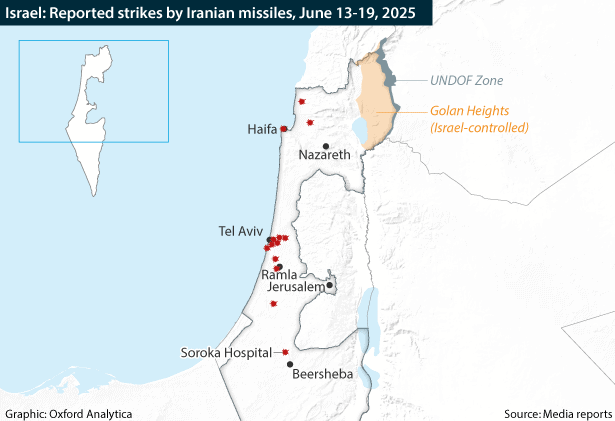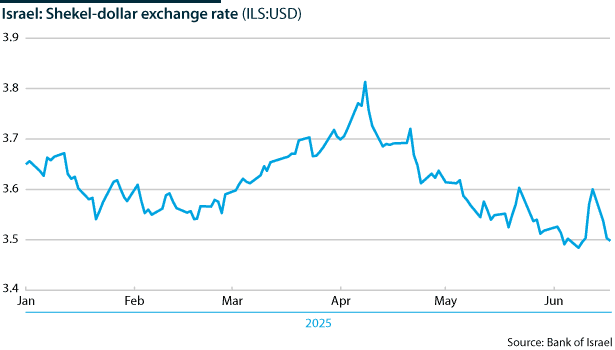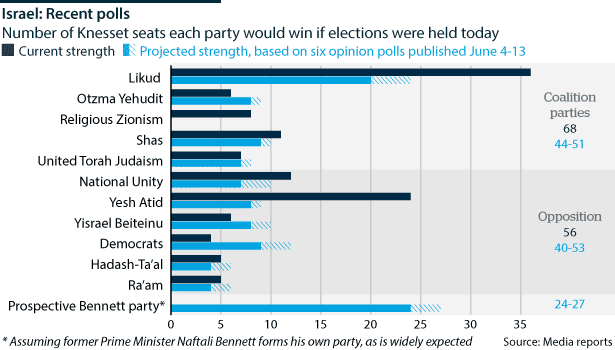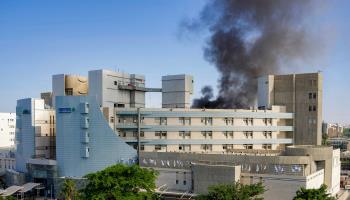So far, Israel’s major military success has had limited political and economic downsides
A fresh Iranian missile barrage today damaged Soroka hospital in southern Israel and hit Tel Aviv suburbs, wounding dozens. Israel also continued its strikes against Iran, which began with the June 13 surprise attack targeting air defences, missile launchers and nuclear assets. The war constitutes a major Israeli effort to alter the balance of power in the Middle East fundamentally, at comparatively little domestic cost.
What’s next
Eliminating Iran as a nuclear and regional threat would significantly lower Israel’s geopolitical risk, with knock-on benefits for the economy and society. However, this looks implausible, even with likely US involvement. In the longer term, a prolonged war would massively increase military spending, with limited political benefit to the current government and significant risks to foreign relations.
Subsidiary Impacts
- The war will strain government finances already stretched by the renewed Gaza offensive.
- The economic and social costs of Iranian missile strikes will mount further.
- Active military engagement by Washington is the key prize — but also carries risks.
- Israel will likely expand its initial goals to include regime change in Tehran, although it will allocate few resources to that end.
Analysis
Israeli forces have scored significant successes in the initial attacks on Iran since June 13, achieving effective control over much of Iranian airspace, killing many of the country’s top military leadership and degrading some of its nuclear programme (see ISRAEL/IRAN: New war will reshape the Middle East – June 13, 2025).
Military Impact
As with the strategy employed last year to defeat Hezbollah in Lebanon, the initial Israeli assault on Iran demonstrated surprising military capabilities, based on long planning, deep intelligence regarding the locations of assets and personnel, deployment of unexpected assets on the ground and sophisticated technology.
This was despite the fact that Israel’s military has been fighting a war on multiple fronts since October 2023. Two campaigns — against Hamas in Gaza and against the Huthis in Yemen — remain active, straining the army’s human resources, ammunition and weaponry (particularly, air defences).
However, the resources required are different. The war against Iran has required significant deployment of fighter jets and air defences, but only a small number of reservists, in contrast to the personnel-heavy Gaza offensive. So far, reported Israeli air force losses are nil.
USD790mn
Estimated daily military cost of Iran war to Israel
Israel has not revealed the financial cost of the war, but one informed source has estimated around ILS2.75bn (USD790mn) per day, divided roughly evenly between offensive and defensive operations. That comes on top of massive unbudgeted spending after fighting resumed in Gaza in March (see ISRAEL: Gaza occupation would quell economic recovery – June 5, 2025).
There are some reports Israel may be running low on expensive Arrow interceptors, which are its main line of air defence. If the war is extended, therefore, the military’s budget spending will be enormous.
Civilian toll
Iran’s return strikes have hit mostly cities and the civilian population, and to a lesser extent, economic infrastructure. They have so far resulted in scores of deaths and hundreds of injuries, mostly minor.

Israel has a sophisticated civil defence system and a multi-layered anti-missile system, which is reportedly stopping around 80-90% of Iran’s missile launches at this stage. However, many civilians remain vulnerable. In the 36 largest towns and cities, an estimated two-thirds of homes have no protected space.
Israelis have become inured to frequent rocket attacks and shelter trips during the war with Hamas and Hezbollah. However, those Iranian missiles that do fall (typically carrying around 300-700 kilograms of explosives) do considerably more physical and psychological damage, with the impact heard up to 35 miles away.
Popular support for the war at the moment remains strong, at 70%, according to a survey conducted on June 15-16 by Agam Labs. However, there were big differences between Israel’s Jewish and Arab populations:
- Some 83% of Israeli Jews backed the strikes, with most expressing confidence in the defence establishment and preparedness for prolonged conflict.
- Among Arab Israelis (about 20% of the population), only 12% supported military action, with 73% favouring diplomacy.
Limited economic damage
The direct missile damage is more severe than Israel has seen in recent years. The Israel Tax Authority said that, four days in, it had received just under 16,000 claims for government compensation, totalling about ILS1bn. That has since risen to 22,932 claims — and will rise further after today’s missile strikes. It contrasts with the 75,000 claims totalling ILS21.7bn recorded over the full 20-month war with Hamas and Hezbollah.
Damage to economic activity has so far been limited. Workplaces and businesses were initially closed, except for essential services such as supermarkets, and indoor and outdoor gatherings prohibited. Some restrictions were later lifted — but further reimpositions and liftings are likely as events develop.
The chief impacts include:
- suspension of production at the Bazan Group oil refinery in Haifa, one of two in Israel, hit by a missile on June 15;
- closure of Israel’s main international airport, Ben-Gurion, until further notice, with foreign airlines suspending service for extended periods;
- halted production at two of Israel’s gas fields, including the largest, Leviathan (see EGYPT: Long Israel-Iran war would weigh on economy – June 17, 2025); and
- pauses at most construction sites, given their lack of protected space for workers, as required by regulations.
Despite these developments, financial markets have been largely positive, betting that the war damage will be contained and that a successful outcome will lower Israel’s geopolitical risk. The Tel Aviv Stock Exchange’s benchmark TA-35 index has risen 4.1% since June 13, and the shekel initially spiked against the US dollar.

If the war ends soon, the overall economic hit will therefore be containable. Even if missile attacks continue, experience shows that economic activity soon returns to normal, as Israelis have developed a high endurance threshold for such barrages. However, mounting military costs would likely force the government to undertake civilian spending cuts and tax increases, while allowing the fiscal deficit to widen.
No political bonus?
The war has probably bought the unpopular Netanyahu government time before it is forced to call an early election, but no long-term improvement in its standing. Prior to the conflict, opinion polls showed the current coalition losing its majority if an election were held now, capturing as few as 44 and no more than 51 seats in the 120-member Knesset (parliament).

Prime Minister Binyamin Netanyahu is likely counting on military success to change this. However, even if the outcome is favourable to Israel, he may not benefit politically, as he faces an immense overhang of public distrust over other issues.
Crucial US ties
The ‘G7’ nations backed Israel in a June 16 statement and called Iran a source of Middle East instability, in contrast to recent outspoken concerns over Gaza. This may reflect the sharing of Israeli intelligence on Iran’s nuclear ambitions, as well as US pressure.
Washington may well join in, but that will not resolve all problems
Israel’s war has the backing of the Trump White House, both diplomatically and in aiding Israeli air defences against Iranian missile attacks. Netanyahu is pushing hard to bring the United States more directly into the conflict, to ‘finish the job’ of ending Iran’s nuclear programme. He may well succeed in the first goal, although the second does not necessarily follow.
Over the longer term, whether or not Washington intervenes militarily, President Donald Trump could blame Netanyahu for a range of possible unsatisfactory outcomes of the war, again straining US-Israeli relations. Meanwhile, the limited support expressed by other Western countries is likely to prove fragile.

Smoke billows from a building at Soroka Hospital in Beersheba in southern Israel following an Iranian missile attack, on June 19, 2025 (Maya Levin/AFP/Getty Images)
Analyst

Dr. Laura James
Deputy Director & Senior Analyst, Middle East

